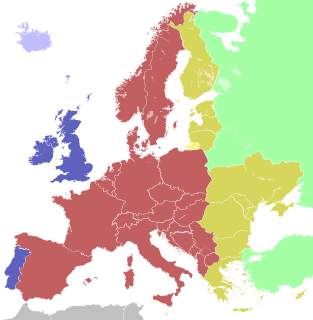The 2006 FIFA World Cup qualification UEFA Group 7 was a UEFA qualifying group for the 2006 FIFA World Cup. The group comprised Belgium, Bosnia and Herzegovina, Lithuania, San Marino, Serbia and Montenegro and Spain.
The Bosnia and Herzegovina women's national football team represents Bosnia and Herzegovina in international football and is controlled by the Football Association of Bosnia and Herzegovina.
The teams competing in Group 9 of the 2015 UEFA European Under-21 Championships qualifying competition are Italy, Serbia, Belgium, Cyprus and Northern Ireland.
The 2015 FIFA Women's World Cup qualification UEFA Group 4 was a UEFA qualifying group for the 2015 FIFA Women's World Cup. The group comprised Bosnia and Herzegovina, Faroe Islands, Northern Ireland, Poland, Scotland and Sweden.
The 2015 FIFA Women's World Cup qualification UEFA Group 5 was a UEFA qualifying group for the 2015 FIFA Women's World Cup. The group comprised Albania, Belgium, Greece, Netherlands, Norway and Portugal.
The UEFA Euro 2016 qualifying Group B was one of the nine groups to decide which teams would qualify for the UEFA Euro 2016 finals tournament. Group B consisted of six teams: Bosnia and Herzegovina, Belgium, Israel, Wales, Cyprus, and Andorra, where they played against each other home-and-away in a round-robin format.
The 2016 UEFA Women's Under-17 Championship qualification' was a women's under-17 football competition organised by UEFA to determine the seven national teams joining the automatically qualified hosts Belarus in the 2016 UEFA Women's Under-17 Championship final tournament.
Group 1 of the 2017 UEFA European Under-21 Championship qualifying competition consists of six teams: Czech Republic, Belgium, Montenegro, Moldova, Latvia, and Malta. The composition of the nine groups in the qualifying group stage was decided by the draw held on 5 February 2015.
The 2018 FIFA World Cup qualification UEFA Group H was one of the nine UEFA groups for 2018 FIFA World Cup qualification. The group consisted of six teams: Belgium, Bosnia and Herzegovina, Greece, Estonia, Cyprus, and Gibraltar.
The 2017 UEFA Women's Under-17 Championship qualifying competition was a women's under-17 football competition that determined the seven teams joining the automatically qualified hosts Czech Republic in the 2017 UEFA Women's Under-17 Championship final tournament.
The 2018 UEFA Women's Under-17 Championship qualifying competition was a women's under-17 football competition that determined the seven teams joining the automatically qualified hosts Lithuania in the 2018 UEFA Women's Under-17 Championship final tournament.
The 2018 UEFA European Under-17 Championship qualifying competition was a men's under-17 football competition that determined the 15 teams joining the automatically qualified hosts England in the 2018 UEFA European Under-17 Championship final tournament.
Group 6 of the 2019 UEFA European Under-21 Championship qualifying competition consists of six teams: Sweden, Belgium, Turkey, Hungary, Cyprus, and Malta. The composition of the nine groups in the qualifying group stage was decided by the draw held on 26 January 2017, with the teams seeded according to their coefficient ranking.
Group 5 of the 2019 UEFA European Under-21 Championship qualifying competition consists of six teams: Portugal, Switzerland, Romania, Wales, Bosnia and Herzegovina, and Liechtenstein. The composition of the nine groups in the qualifying group stage was decided by the draw held on 26 January 2017, with the teams seeded according to their coefficient ranking.
UEFA Group 1 of the 2019 FIFA Women's World Cup qualification competition consisted of five teams: England, Russia, Wales, Bosnia and Herzegovina, and Kazakhstan. The composition of the seven groups in the qualifying group stage was decided by the draw held on 25 April 2017, with the teams seeded according to their coefficient ranking.
UEFA Group 6 of the 2019 FIFA Women's World Cup qualification competition consisted of five teams: Italy, Belgium, Romania, Portugal, and Moldova. The composition of the seven groups in the qualifying group stage was decided by the draw held on 25 April 2017, with the teams seeded according to their coefficient ranking.
The 2017–18 UEFA Youth League Domestic Champions Path was played from 27 September to 22 November 2017. A total of 32 teams competed in the Domestic Champions Path to decide 8 of the 24 places in the knockout phase of the 2017–18 UEFA Youth League.
The 2019 UEFA European Under-17 Championship qualifying competition is a men's under-17 football competition that will determine the 15 teams joining the automatically qualified hosts Republic of Ireland in the 2019 UEFA European Under-17 Championship final tournament.
The 2019 UEFA Women's Under-17 Championship qualifying competition is a women's under-17 football competition that will determine the seven teams joining the automatically qualified hosts Bulgaria in the 2019 UEFA Women's Under-17 Championship final tournament.
The UEFA play-offs of the 2019 FIFA Women's World Cup qualification competition involve the four runners-up with the best records among all seven groups in the qualifying group stage.









